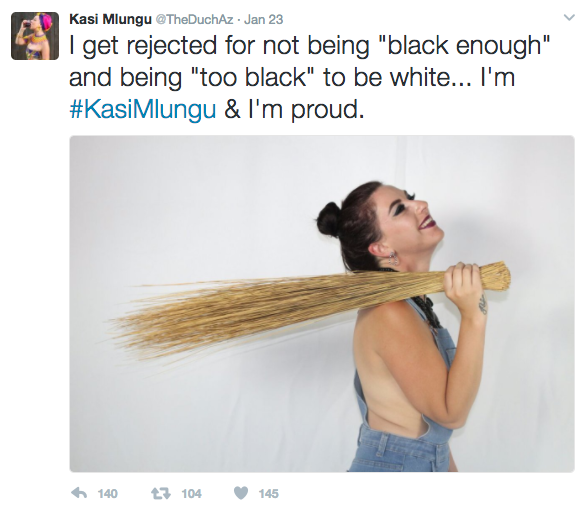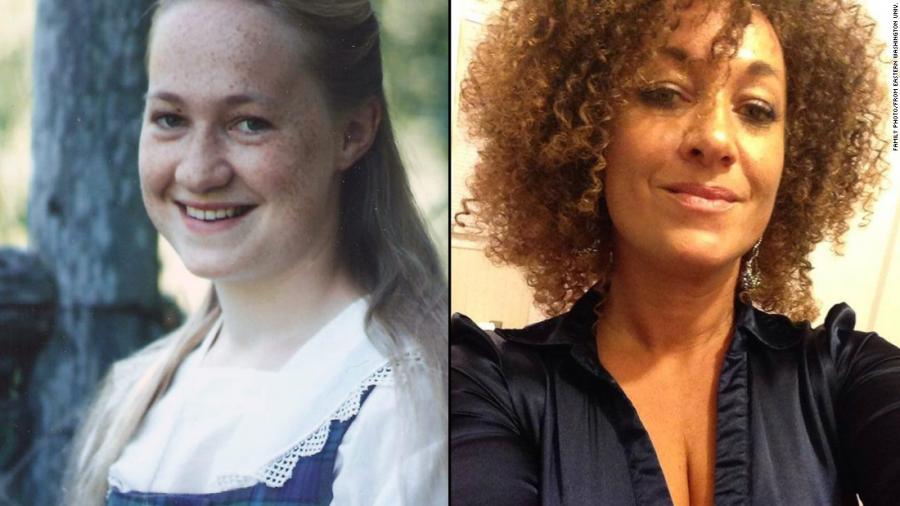
"My skin is White, but inside I’m Black"
How (White) privilege problematizes the idea of transracialism
From South Africa to the USA, people are being accused of cultural appropriation and responding with 'transracialism' as justification. While most discourse focuses on the problematic comparisons between transracial and transgender, there are few definitions for transracial. Furthermore, one major aspect problematizes the term in a pivotal way: white privilege.
Too Black to be White?

The tweet that started it all.
The rainbow nation has had its fair share of racial and cultural tensions, but recently Anita Ronge is making waves in the South African House music scene that caused a nation-wide debate. She is a White DJ, spinning House music in Black townships exclusively. House music is an institution in South Africa, especially in Black culture. Her stage name is 'DJ The DachAz', but her friends have dubbed her Kasi Mlungu. It could be seen as a term of endearment for a white friend of the community. ‘Kasi’ being slang for Black township and ‘Mlungu’ being a white person.
Unlike Rachel Dolezal, who was globally ridiculed when her parents exposed her as a White person passing as African American, Mlungu's whiteness is, however, palpable. It is a stark contrast to her ‘Africanized’ style. In January this year, a tweet by Mlungu sparked a conversation about cultural appropriation and White privilege to which she responded with bold claims distancing herself from the associated accusations. Among the backlash, reactions to Mlungu have been mixed to a surprising extent. Polarised polemics about colorblindness in post-Apartheid South Africa were jumpstarted, while the rest of the world grapples with heightened racial tensions within anti-categorization rhetoric.

Rachel Dolezal then (left), and now (right).
... she has legally changed her name to Nkechinyere Amare Diallo, which is of Nigerian origin ...
Meanwhile in the birthplace of #BlackLivesMatter, Rachel Dolezal has crawled out of the woodwork since being exposed as perceivably using Blackface. It seems she may be trying to get her memoir, “In full color”, publicly accepted after all, but one publisher refused to entertain her literary attempt at justification-cum-vindication. Dolezal is currently penniless, ostracized, and down on her luck, yet standing tall in her conviction as an unapologetic transracial Black female. It has also just been reported that she has legally changed her name to Nkechinyere Amare Diallo, which is of Nigerian origin, to further convince the world that she is indeed Black.
The parallels between the two stories are hard to ignore, but they are very different indeed. On the one hand, Kasi “My skin is just white, but inside I’m Black” Mlungu has not overtly identified as transracial, yet represents the problematic and essentialist notions of culture and race disguised as colorblindness, i.e. clothing as a cultural cloak that can easily be removed to shift the boundaries of race and culture. On the other hand Dolezal represents the more salient aspects that social constructions of race, such as physical appearances like hair and skin tone, manifest under the polemics of transracialism. In other words, Rachel could fool everyone for a number of years since she appeared to look mixed race in the eyes of those around her, while Mlungu would find it hard if not impossible to achieve the same level of visible 'Blackness'. She can always remain a White female dressed in the clothing of Black culture. Thus while the ‘be who you are’ stuff is inspiring advertising campaigns and best-selling self-help books, both cases represent a caveat in the time of Caitlyn Jenner, the Otherkin and Iggy Azalea. None of who symbolize new concepts of transculturation by the way, despite what the world may think. It warns a resounding alarm to always check your privilege.
... while the ‘be who you are’ stuff is inspiring advertising campaigns and best-selling self-help books, both cases represent a caveat...
 © giphy.com
© giphy.com

Bring back ‘Check your privilege!’
‘Check your privilege’ fatigue may have set in as the world became more progressive, but really it should be the guiding principle upon which all people act, understand and construct their daily lives. Mlungu claiming that she is not privileged by saying, “I have worked myself to death to get to where I am,” is simply based on her subjective experience with financial lack. Unfortunately, citing poverty to deny your White privilege is objectively wrong. For one, it is Mlungu’s 'whiteness' that elevated her status within the predominantly Black South African House music community and beyond. It is why she stands out as the great white shark, so to speak. Quite frankly, it is because of her skin color that #kasimlungu began trending on Twitter and people paid attention. Within a crowd of up-and-coming Black female DJs, she is the G-Eazy, the Eminem and the Iggy Azalea; while a Black female DJ in the same genre may not stand out from the crowd, i.e. the music industry's prerequisite for success. For this unfair advantage, we cannot hold Mlungu accountable.
Unfortunately, citing poverty to deny your White privilege is objectively wrong.
We can, however, hold her accountable for her rejection of white privilege. By rejecting her privilege, she zeros The Struggle in South Africa and the “survival of subordinated cultures and their resistance to dominant cultures,” which is incidentally situated within cultural appropriation and “inescapably intertwined with cultural politics” (Rogers, 2006: 474). But wouldn’t we all love to live in a colorblind society if we could? As a South African myself, I certainly would. But I’ll always be conscious of The Struggle, colonization and slavery. That is how privilege is checked. Dolezal may have avoided deceiving the world with her extreme and overt physical appropriations of Black culture despite the circumstances she described to “set the record straight” as she put it. She simply should have checked her privilege.
Transculturation
Rogers (2006) conceptualized four distinct, yet linked categories of cultural appropriation: cultural exchange, dominance, exploitation and transculturation. Transculturation is the long-term, systematic effect of years of appropriations caused by exchange, dominance and exploitation among multiple cultures in close proximity. He thus posited that transculturation challenges essentialist notions of culture posed by these three preceding categories. Transculturation creates a space for the salient, dialogical and relational nature of culture since it is “itself [..] constituted by acts of appropriation” (2006: 475) over a period of time. Rogers henceforth emphasized the importance of acknowledging history by saying: “Although transculturation recognizes issues of power, assumptions of cultural purity, degradation, bounded singularity, and essence are problematized as both empirically questionable and ideologically circumspect due to the implication of such assumptions in (neo)colonialism and other oppressive systems” (2006: 499). Thus, it leaves room for the less exploitive constituents of appropriation and is the anti-hero in society’s quest for progressiveness: flawed, yet redeemed by acts of consciousness and awareness. In other words, always remain cognizant of human history in addition to the resulting condition and marginalization of Black people.
... but we cannot socially reconstruct the subjectivity of the Black condition objectively.
Always check your privilege whether you submit to transculturation, colorblindness, or whatever you may stand for. Yes, we live in a world where non-binary and anti-categorization rhetoric trumps social constructions of gender and race, but we cannot socially reconstruct the subjectivity of the Black condition objectively. Colorblindness hinges on checking your (White) privilege. We should bring back the catchphrase for the Kasi Mlungus and Rachel Dolezals of the world.
References
Rogers, R. A. (2006). From Cultural Exchange to Transculturation: A Review and Reconceptualization of Cultural Appropriation. Communication Theory, 16, 474-503.